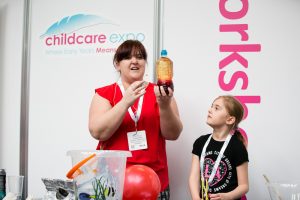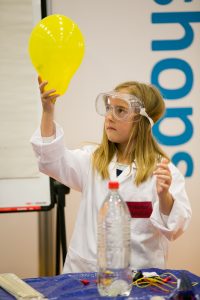Science in the early years by Jo Baranek
25th April 2017
Share this entry:
“The science of today is the technology of tomorrow” Edward Teller
Exploration and investigation are essential in early years and teaches our children many skills as well as developing their senses and physical attributes, but what does this have to do with science I hear you say. Science in the early years is not about test tubes, Bunsen burners and the periodic table, it is much more fundamental than that and paves the way for our future explorers, investigators, inventors and scientists. We need to support and challenge our children with new ideas, resources and access to the natural world in order to develop these investigative skills.

Moving onto the toddlers, we should continue with these types of activities to further develop these skills and knowledge. However, as the children grow they are becoming more active and more inquisitive so we need to support this with the resources and environment we provide. Offer opportunities for the children to go into the wider world and start to explore on a larger scale, e.g. mud areas with different materials for the children to add into the mud, including water. Talk to the children about the difference water makes to the mud, what about adding sand into the mud? The more children can explore the aspects of science the better placed they are as they progress through lifelong learning.
Preschool children are naturally explorative and want to learn much more about the world by delving in, getting involved and pulling apart and putting things back together, as a practitioner we are instrumental in supporting this by providing the right resources and environments.
Think about resources that the children can take apart and investigate how they work, e.g. old keyboards, telephones, remote controls, doorbells etc. Ask your parents to bring in old equipment from home and these activities will cost you the price of a screwdriver! Boys in particular love to deconstruct and reconstruct and this is all great problem solving as well as exploring how things work.
Take the children into the outdoors and explore the natural world, the weather, the insects, plants, flowers, trees, textures, manmade and natural resources, notice the differences, similarities and properties of all these different materials. Use the natural (and FREE!) resources around you!
Other ways of engaging children in science is to do fun experiments with everyday materials such as baking soda, vinegar, balloons, potatoes, straws and plastic bottles and other junk modelling equipment. There are lots of fun activities in NDNA’s publication “Your Essential Guide to Inspiring Your Little Scientists” and new online course “Little Scientists Leading the Way” and a select few of these will be showcased at Childcare Expo Manchester in my interactive workshop where you can come along and have a go and poking a kebab stick through a balloon without it popping amongst others!
Click here to register for your free tickets to attend Childcare Expo Manchester on 16th & 17th June 2017.
Why attend Childcare Expo?
Join over 2,500 like-minded individuals from the early years sector who are dedicated to improving both practice and their childcare settings.
Attend educational seminars to credit your CPD
Meet the experts to have your questions answered
Receive fantastic onsite offers and discounts
Experience expert-led informative hands-on workshops
Network with peers and industry players
Pick up hundreds of new product ideas and services
And most of all, enjoy a great day out with your colleagues




